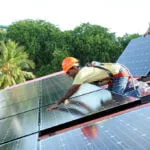Adopting a sustainable lifestyle and preparing for unexpected situations has recently gained popularity. Solar generators have become indispensable for supplying dependable, eco-friendly power. With numerous models and features, finding the ideal portable solar generator for your needs can be challenging. Our comprehensive guide is here to help, providing valuable information on the top portable solar generators and expert advice on choosing the perfect one for your needs.
This guide features in-depth reviews of the best portable solar generators, meticulously analyzing each model’s capacity, output options, charging capabilities, and more. We’ve also included an FAQ section covering essential subjects like sizing, solar panel choice, and generator lifespan to assist your decision-making process further.
Editor’s note: We’ve opted to showcase solar generator packages rather than individual generators. We assume most readers will require compatible solar panels if searching for a generator. In all cases, these manufacturers offer the generator alone, saving you a significant amount if you already possess solar panels!
Our Pick
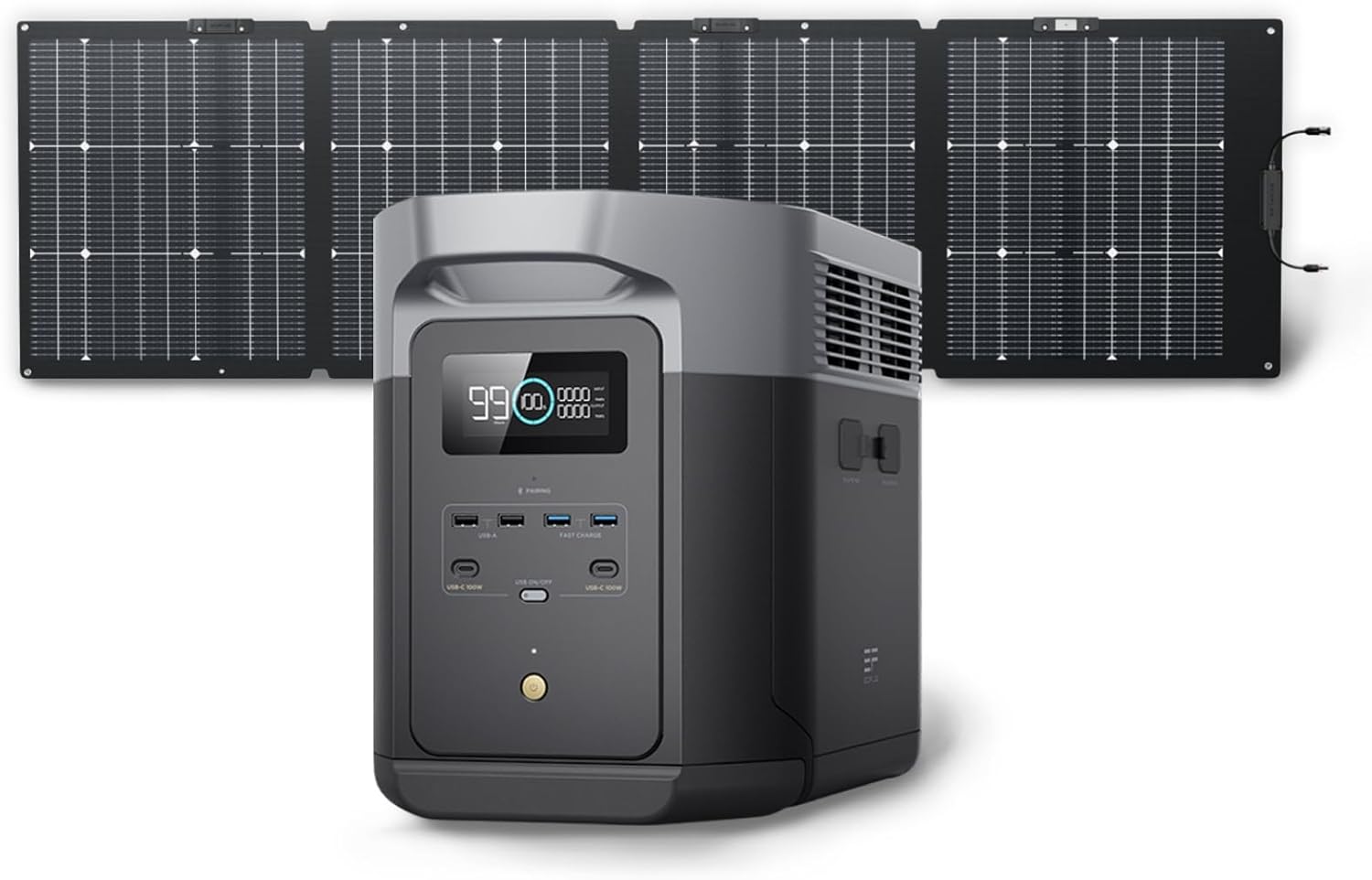 EcoFlow Delta 2 Max |
Runner-Up
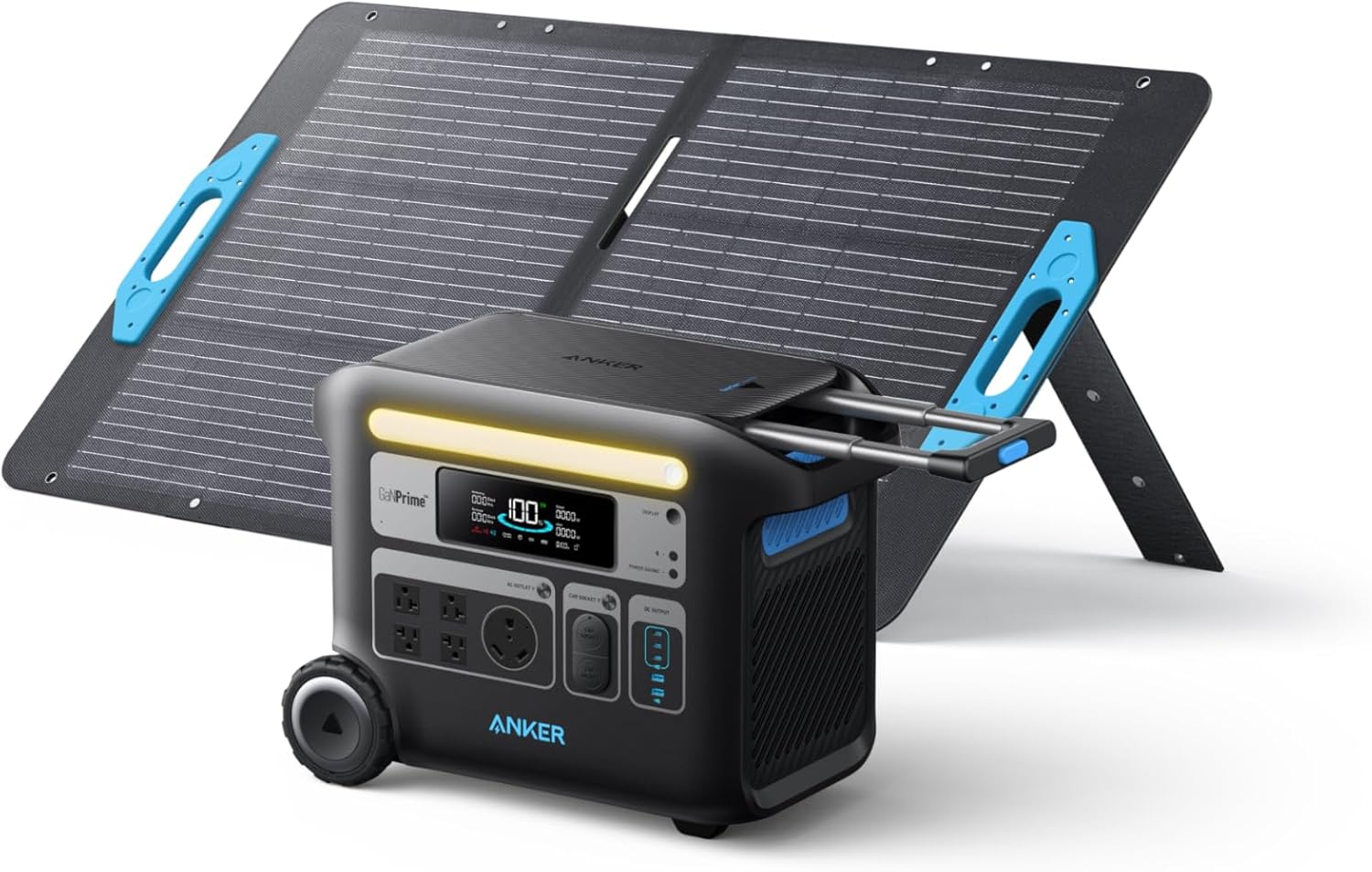 Anker SOLIX F2000 |
More Power
 Jackery Explorer 3000 Pro |
|
|---|---|---|---|
| Capacity | 2,048Wh | 2,048Wh | 3,024Wh |
| Continuous Output | 2400W | 2400W | 3000W |
| Surge Power | 4800W | 2800W | 6000W |
| Ports | 6 AC, 2 USB-A, 2 USB-C, 2 DC | 5 AC (RV Port), 2 USB-A, 3 USB-C, 2 DC | 5 AC, 2 USB-A. 2 USB-C, DC |
Table of Contents
The Best Portable Solar Generators
Here’s our current picks, updated for 2025.

Run almost any of your home appliances with an output of up to 2400W.
The EcoFlow Delta 2 Max tops our list thanks to its exceptional versatility, powerful output, and efficient solar charging. With a 2,048Wh capacity and a continuous output of 2,400W, this generator comfortably powers essential appliances, electronics, and tools during outdoor adventures or emergencies. Its sleek, portable design, rapid charging capability, and expandability make it the perfect companion for camping, RV trips, or backup power.

Powers 12 Devices: An exclusive RV port, 4 AC ports, 3 USB-C, 2 USB-A ports, 2 car outlets
Anker’s SOLIX F2000 closely follows with its impressive 2,048Wh battery capacity and robust 2,400W continuous power output. Ideal for extended camping trips, RV living, and off-grid adventures, the SOLIX F2000 combines durability with convenience, featuring multiple ports and efficient solar charging. It’s slightly heavier than the Delta 2 Max, but its reliability and build quality make it an outstanding choice.

With a vast 3024Wh capacity and massive 3000W power output, the power station supports 99% of appliances.
The Jackery Explorer 3000 Pro strikes an ideal balance between power and portability. Its 3,000Wh battery ensures ample power for weekend getaways or extended road trips, and it can run small refrigerators, portable heaters, and various gadgets. It features rapid solar charging and intuitive controls, making it easy for users to monitor and manage their energy usage.

Not many ports, but you won’t find a more portable solar generator than this.
With its compact form and substantial 2,073.6Wh battery, the Bluetti Elite 200 V2 is ideal for those needing reliable energy in a smaller package. Designed with durability in mind, its LiFePO4 battery promises an extended lifespan of up to 17 years, making it a wise long-term investment for regular campers and travelers.

While only 1,024Wh in capacity, this may prove a better option if you don’t plan to power a lot, as it’s relatively inexpensive.
The Anker SOLIX C1000 is perfect for casual campers and those who need portability without sacrificing significant power output. Its 1,024Wh capacity and 1,800W continuous output comfortably power smaller appliances, phones, laptops, and lights. Lightweight and highly portable, it’s an excellent choice for short-term off-grid adventures.
What Size Solar Generator Do I Need?
The size of the solar generator you require depends on various factors, such as the total power consumption of the devices and appliances you intend to use, the length of usage, and whether the generator is for occasional or more extended periods of use.
Calculate the total wattage of the devices you plan to power to determine the appropriate size for your solar generator. Sum up the wattage of each device and consider its daily usage duration. Multiply the total wattage by the hours you plan to use to obtain the necessary watt-hours.
Next, consider the generator’s capacity, measured in watt-hours (Wh), which indicates the amount of energy it can store. Select a generator with a capacity that meets or exceeds the required watt-hours. It’s also wise to have some extra capacity as a buffer, especially on cloudy days when solar charging may be less efficient.
Additionally, pay attention to the generator’s inverter rating, which is measured in watts (W). This determines the maximum power it can provide at a given time. Ensure that the generator’s inverter rating can handle the peak power demands of your devices and appliances. Remember that your needs may change over time, and it’s often better to invest in a slightly larger solar generator than initially needed to accommodate future expansion or additional devices.
How to Calculate the Necessary Generator Capacity
Let’s use an example to explain this concept. Suppose you have a fridge that needs 600W power, a 5W phone charger, and four 5W LED lights. You’d want enough power to keep the refrigerator and lights running for six hours, but you’d only need the phone charger for about two hours.
| Device | Quantity | Wattage | Hours | Total |
|---|---|---|---|---|
| Refrigerator | 1 | 600W | 6h | 3,600Wh |
| LED Lights | 4 | 5W | 6h | 120Wh |
| Phone Charger | 1 | 5W | 2h | 10Wh |
| Total | 3,730Wh |
In this example, you’d want a generator with a capacity of at least 3,730Wh. Remember that some electronics, like refrigerators, initially require more power to start up. Surge power must be lower than the peak power requirements of the devices you’d like to power with your solar generator.
Frequently Asked Questions
Here are some of our readers’ most frequently asked questions on solar generators.
Do portable solar generators have an advantage over gas-powered generators?
The choice between solar and gas generators depends on your individual needs and preferences, as each has pros and cons. Here’s a brief comparison:
- Fuel source: Portable solar generators utilize sunlight, a free and renewable resource, while gas generators need gasoline or other fuel types, which can be costly and not always available, especially during emergencies or natural disasters.
- Noise level: Portable solar generators work silently, making them perfect for residential areas or outdoor activities where noise is a concern. On the other hand, gas generators generate noise during operation and can be disruptive.
- Maintenance: Portable solar generators usually require less maintenance than gas generators, as they have fewer moving parts and don’t need regular oil changes, spark plug replacements, or fuel refills. However, solar panels may require occasional cleaning to maintain efficiency.
- Environmental impact: Portable solar generators produce no emissions and have a lower environmental footprint than gas generators, which emit pollutants and contribute to air pollution.
- Power output and runtime: Gas generators often have a higher power output and longer runtime, making them suitable for powering large appliances or providing backup power during extended outages. Portable solar generators, on the other hand, are generally more limited in power output and runtime, depending on battery capacity and sunlight availability.
- Initial cost and long-term expenses: Portable solar generators may have a higher upfront cost than gas generators. However, they tend to have lower long-term operating costs since they don’t require fuel purchases and have reduced maintenance expenses.
What type of solar panels are needed for a solar generator?
Your solar generator’s required panels depend on the generator’s input specifications, your energy demands, and your location’s sunlight availability. Choosing high-quality solar panels from reputable manufacturers is crucial for enhancing charging efficiency and overall performance.
Opt for panels with an efficiency rating of 18-22%. Higher efficiency panels generate more power in a smaller area, making them ideal for situations with limited space or less sunlight. Ensure your panels include the necessary connectors and cables for your solar generator.
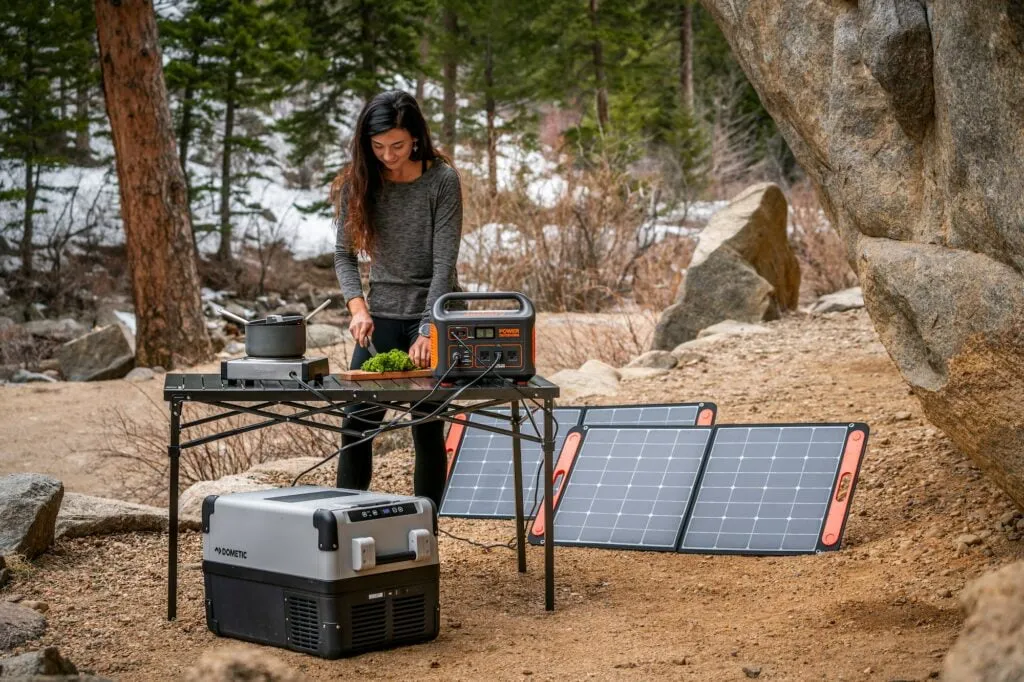
What size solar generator is required to power a house?
Powering an entire house with solar is challenging due to varying energy requirements based on house size, number of occupants, and types and quantities of appliances and devices used. We recommend using portable solar generators as backup power sources, not primary ones. However, powering a small living space like a tiny home might be feasible. Refer to the answer to the first question for guidance on determining your needs.
How long is the lifespan of a portable solar generator?
A solar generator’s lifespan depends on component quality, usage patterns, and maintenance. Typically, a solar generator can last 10 to 15 years or more. Most portable solar generators use lithium-ion or lithium iron phosphate (LiFePO4) batteries, which usually last between 2,000 and 5,000 charge cycles or more, depending on quality and usage. Proper care and maintenance ensure a high-quality battery lasts up to 10 years or longer.
The inverter and other electronic components in a solar generator have varying lifespans. Inverters generally last 10 to 15 years, while other elements like charge controllers and wiring can last even longer with proper maintenance. Solar panels can last even longer, sometimes up to two to three decades.
Is portable solar generator maintenance challenging?
Portable solar generator maintenance is generally not complex but does require regular care and attention to ensure optimal performance and longevity. Here are some essential maintenance tips:
Clean the solar panels: Dust, dirt, and debris can reduce efficiency and power output. Clean the panels regularly using a soft cloth, mild soap, and water to remove dirt and grime. Be gentle and avoid using abrasive cleaning tools or chemicals that could damage the panels.
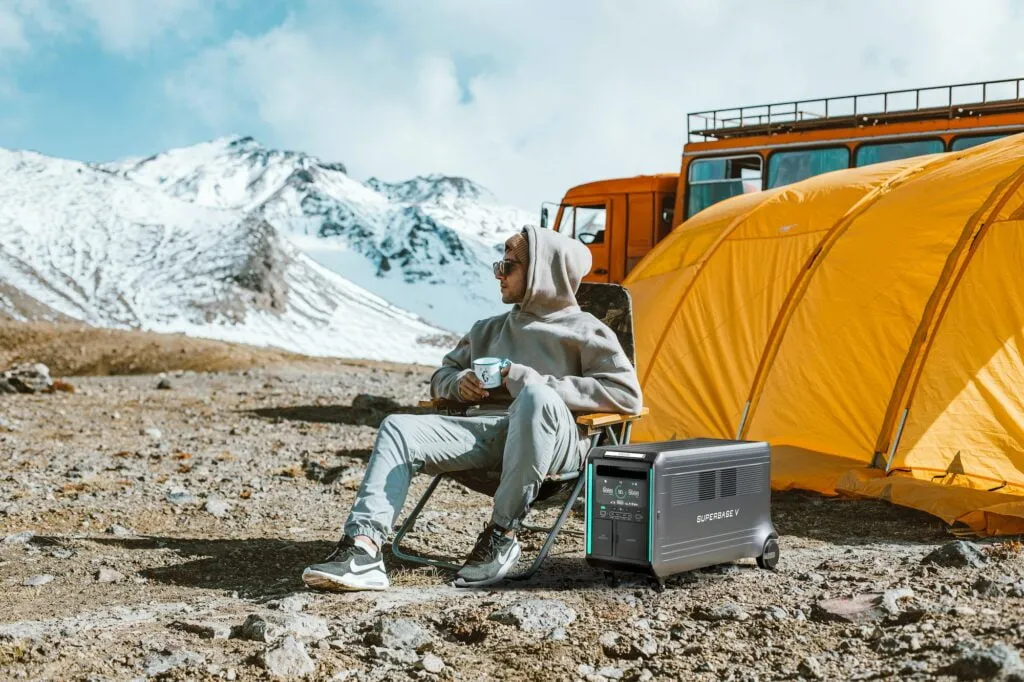
How to Shop for Portable Solar Generators
When searching for the perfect solar generator, it’s crucial to consider various factors to ensure you select the right model for your off-grid power needs. Here are some key aspects to keep in mind:
- Purpose and energy requirements: Identify the primary purpose of the solar generator, such as camping, RV trips, emergency backup power, or off-grid living. Assess your energy requirements and select a generator with the capacity and output to meet your needs.
- Output ports: Seek a solar generator with a diverse array of output ports, including AC outlets, USB-A and USB-C ports, and a 12V DC car port. A broad range of ports ensures compatibility with numerous devices and appliances, increasing its versatility and practicality.
- Charging options: Opt for a solar generator with multiple charging options, such as solar panels, an AC wall outlet, and a 12V car outlet. This provides flexibility and convenience, enabling you to recharge the generator efficiently even when sunlight is scarce.
- Portability and weight: If you intend to use your solar generator for outdoor activities or travel, consider its portability and weight. A lightweight generator featuring a built-in handle and compact design will be more accessible for transport and storage.
- Quality and durability: Select a solar generator from a reputable manufacturer known for quality and durability. Look for models made with high-quality materials and components that endure regular use and harsh environments.
- Expandability and scalability: Some portable solar generators provide expandability options, such as connecting extra batteries or solar panels. This feature is advantageous if you expect your energy needs to grow over time or want the flexibility to adapt your system to various situations.
- Warranty and customer support: A robust warranty and responsive customer support offer peace of mind when investing in a solar generator. Look for manufacturers that stand behind their products and provide reliable assistance.
Wrapping Up
Portable solar generators offer a clean, renewable, and versatile power source for various off-grid applications, including camping, RV trips, emergency backup power, and off-grid living. By considering factors such as purpose, energy requirements, output ports, charging options, portability, quality, expandability, and warranty, you can find the ideal solar generator to suit your needs. Investing in a high-quality portable solar generator reduces reliance on traditional fuel sources and contributes to a more sustainable and eco-friendly lifestyle.




